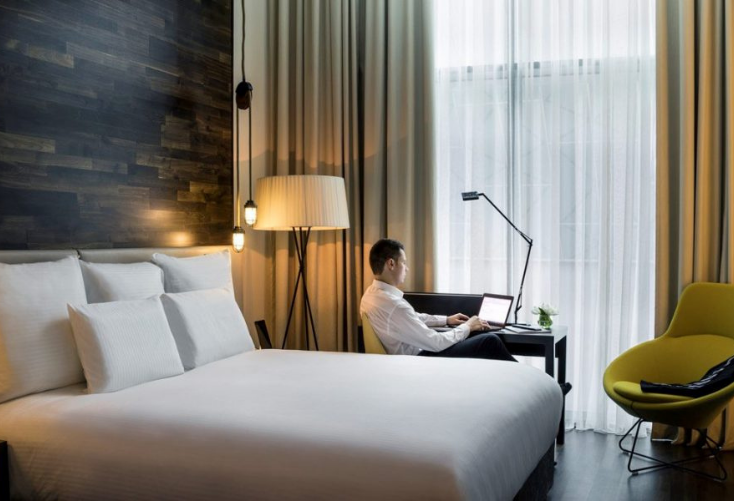Hand selected flexible workspace news from the most reliable sources to keep you ahead of the pack. We find all the latest news, so you don’t have to. Morning and afternoon updates. Stay in the know.
Here’s what you need to know today:
- Accor Will Begin Offering Workspace In Its Hotels NEW
- Why Company HQ May Be A Thing Of The Past NEW
- Communication And Security Issues A Top Priority For Remote Work NEW
- Manhattan Landlord Sues Knotel
- HR Leaders are Adapting Policies for the Remote Work Era
- ‘Hub and Spoke’ Offices Promote Wellness and Shorter Commutes
Accor Will Begin Offering Workspace In Its Hotels
Accor has announced that it will start offering workspaces for £35 a day. The cost includes added perks of room service and a bar below. The new service, called Hotel Office, will offer isolated spaces and access to the hotel’s facilities. The move is a response to the expected increase in work from anywhere arrangements.
Speaking about the company’s decision, Karelle Lamouche, chief commercial officer, Accor Europe, said:
“Workers are looking for alternatives to home working and many aren’t ready to or can’t return to offices. Hotel Office is a safe and flexible ‘working from anywhere’ solution to meet spontaneous needs as well as planned working. Hotel Office also responds to the needs of employers needing to tackle productivity drops whilst answering their duty of care to their staff to meet their physical and mental work pressures. As such many employers need a cost-effective, contract-free workspace solution for their staff which provides a reduced commute, flexibility and productivity in safe, clean private work spaces.”

Why Company HQ May Be A Thing Of The Past
The COVID-19 pandemic forced many organizations to embrace remote work practices, leaving offices empty for months.
After several months of working from home, workers are increasingly reporting that they would like to keep working from home at least part-time. This will have big implications for offices and company headquarters.
Not only will worker preferences change the office, but also companies will likely rethink their real estate strategy as they find ways to reduce costs to make up for the losses caused by the pandemic.
While there will be offices in the future of work, large campuses and headquarters will likely be a thing of the past, or at least they will significantly decrease in size. Organizations will likely adopt more flexible work arrangements and environments, like coworking spaces in order to provide a choice-based work experience.

Communication And Security Issues A Top Priority For Remote Work
One positive thing that has come out of the COVID-19 pandemic is that companies and workers alike have now realized the benefits that working remotely offers.
With organizations and individuals more comfortable and familiarized with the idea of working from home, many expect WFH to remain a core part of work arrangements in the future. So much in fact, that recent surveys have found that 44% of workers would be willing to take a pay cut in order to keep their work from home benefit.
Remote work will be a key part of the future of work. It will no longer be a benefit companies can offer, but something that employees will likely demand.
This means that companies will need to think about how to overcome the challenges associated with working from home. Two particular areas they will need to focus on include effective online management and communication, as well as secure remote work practices (data, privacy, security).
To ensure remote work success, organizations will need to ensure that employees feel supported and that they have access to the tools and resources they need.

Manhattan Landlord Sues Knotel
The landlord of a Manhattan office building is reportedly suing Knotel, one of its tenants, for $536,000.
According to the lawsuit, building owners United Group and American Equities allege that Knotel owes rent for April, May and June.
The flexible office company occupies space across five floors of the 12-storey building at 29 West 35th Street. The lawsuit is one of several currently faced by Knotel, which is said to be evaluating its portfolio and working to reach positive resolutions with landlords.
Another tenant in the same office building, business software provider Sprinklr, is also being sued for $283,000 for rent and legal fees. Together, the two companies occupy more than 75% of the building’s office space.

HR Leaders are Adapting Policies for the Remote Work Era
Is ‘work from home’ the new norm? For many workers, it’s the current norm that may well become permanent.
Some sources claim that 60% of CFOs say they’re ready to make – or already have made – remote work a permanent option for employees.
Now, HR leaders are working to adapt remote work policies to ensure they fit this new reality.
“Given the rise in remote work, it’s almost critical to review and update HR policies, especially since it used to be when a person joined a company, policies were in place,” says Max Muller, Principal at Max Muller & Associates. “Now policies are chasing the reality, and the reality isn’t well-formed.”
HR leaders are urging companies to think flexibly about new policies, given that working conditions are changing and evolving rapidly, and to deliver clear and frequent communications.

‘Hub and Spoke’ Offices Promote Wellness and Shorter Commutes
For many people, working from home just isn’t working. Family distractions, inadequate space and shaky WiFi are just some of the reasons people are eagerly heading back to the office.
But getting to work on public transport is still a problem — and that’s why many are now seeking to WNH (Work Near Home) instead of WFH (Work From Home).
Some office companies are offering a solution in the form of a ‘hub and spoke’ approach. It allows companies to decentralize their teams and place them in multiple office locations, enabling physical distancing as well as shorter commutes.
It also enables the physical connections that can promote a sense of wellbeing and greater productivity.
Sharon Bachar, head of people EMEA at WeWork, says we are facing “a pandemic of loneliness” owing to work from home guidelines.
“At the beginning, people were very excited to be working from home. Over time it has become pretty clear to us that most people actually crave that sense of belonging – that engagement and ability to connect, see and talk to each other.
“We are social animals, we crave interaction – we need it both for our survival and for our mental health.”


















